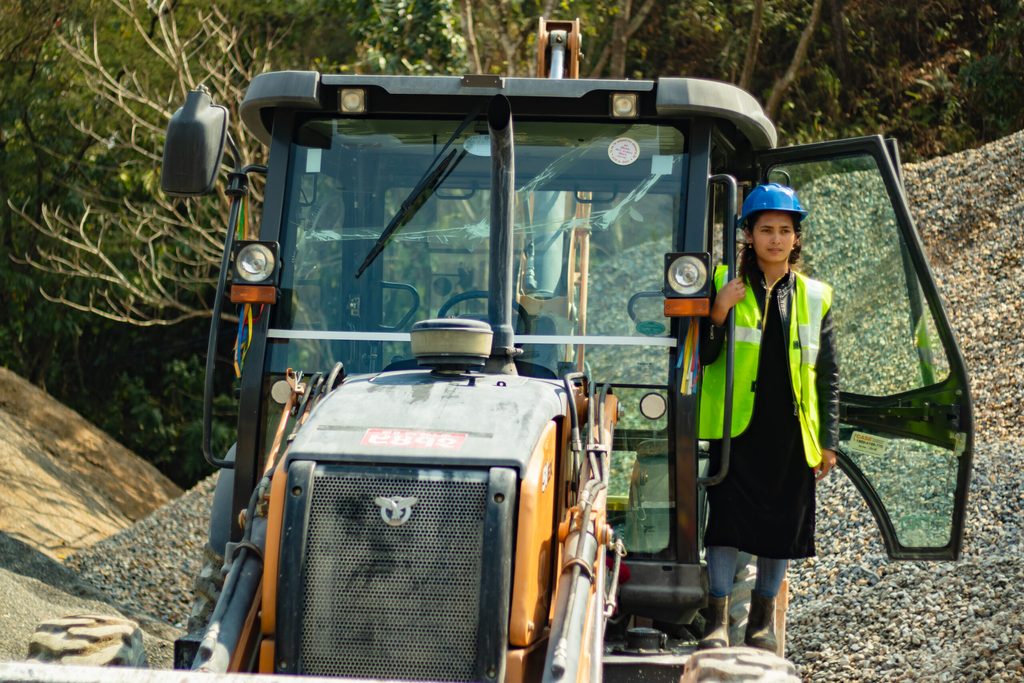Meet the trailblazing young woman in the construction industry
Sushma is smashing stereotypes around work and is now employed in the construction industry following skills training.

“I feel happy to say that I am an excavator operator. I am one of very few women who have chosen a different profession, mainly dominated by men,” says Sushma who has been working in the construction industry for the last few months after taking part in a training course supported by Plan International.
“Before joining the training, I didn’t have any idea that women could also be construction workers and operate heavy equipment,” says Sushma who joined the skills training programme along with 9 other young women aged 18-24. “Among the 10 of us, 5 now have jobs.”
Sushma hopes to obtain her heavy equipment license after completing 2 years working as an excavator operator. Before joining the training scheme, she was a homemaker whose daily routine involved doing household chores and caring for her 4-year-old daughter.
Born in Prabat district in Nepal, Sushma’s life became harder after the death of her father. Her mother raised her and her 3 younger siblings by working in seasonal labour, but the income she made was not enough to support 4 children so Sushma often used to help her mother by working alongside her in the fields to bring in a little extra income.
Discrimination holds girls back
After completing grade 12, her family’s difficult financial situation meant she had to drop out of school early. Not long after, she was married to a man that her family had selected for her. Her husband now works abroad and sends a little money back to Sushma each month, but it was not enough to fulfill all their needs.
I took part in various training sessions which helped boost my confidence.
Sushma
Deciding she needed to find a way to earn an income herself, Sushma moved to the popular tourist city of Pokhara with her daughter and younger sisters in the hope that she would be able to support their education.
When she arrived, she started searching for a job. However, without any skills or training, she was unable to find any employment but did see an advert from Plan International offering free excavator operating training to unemployed women. Curious to learn more, she decided to apply.
“I found it strange to be selected to receive training to operate a JCB as I had not seen a female excavator operator before. However, I was inspired to go for the training since there are very few people working as excavator operators. On top of this, I had heard it provided a good income compared to other jobs,” explains Sushma.
Breaking stereotypes
During the initial training phase, Sushma says she found it difficult to convince her family members, including her husband, that she could work in the construction industry. They suggested that she apply for a different skills training course more suitable to her gender, however, she was firm in her resolve and decided to stay on her current course.
“I still remember the first day of my training, when we were introduced to the JCB. I was scared and nervous. I questioned myself, wondering how I was going to operate such heavy equipment. But gradually, everything became normal. There were also 9 other young women trainees, so I was motivated by them. We used to cheer each other on,” says Sushma.
As well as learning how to operate the excavator, Sushma also receive training in additional soft skills such as protection from violence, English language, computing, conflict management, and effective communication.

“I took part in various training sessions which helped boost my confidence. I am proud to say that after completing a month of training, I was offered practical work experience. I worked for 15 days as a trainee. Luckily, I then received a job offer at the same place. Now, I am working as an assistant excavator operator. I earn NRs.1000 (€7) per day. In addition to this, I am also provided with a food allowance.”
Sushma says she is very happy with her job and now hopes to be able to pay the education costs for her daughter and sisters. Along with this, she also wants to be able to continue her education hopes to inspire other women to forge similar careers in male-dominated spaces.
“Women should get equal employment opportunities to achieve gender equality. The Government of Nepal has formulated and adopted policies related to gender equality, however, their implementation is slow. Therefore, I would ask Plan International and its partner organisations to lobby for gender equality, decent wages, and equal opportunities for women in every sector,” concludes Sushma.
About the project
Right4Children is implementing the Promoting Young Women in Employment in Pokhara project with funding and technical support from Plan International. The project aims to equip young women with marketable skills and help them to make the most of emerging job opportunities.
Right4Children is implementing the project in close coordination and collaboration with private-sector training providers. The project aims to train 800 young women like Sushma in marketable job skills, life skills, basic computer skills, and basic English language so they can find decent paid employment.
Categories: Skills and work


